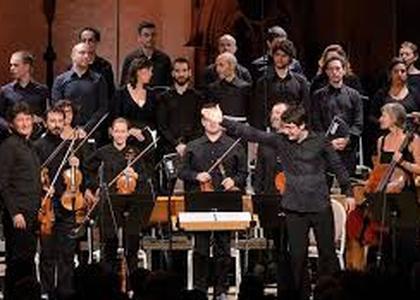> Vote for the classical album of 2016

Händel in Rome – 1707 – the album of the Ghislieri Choir & Consort ensemble, conducted by Giulio Prandi, in premiere at CD Review on the 14th and 15th of November
If you would like to
vote for this cd please vote HERE
Händel enthrals Rome
After surprising his hosts with his organ concerto, held on the 14th of January 1707, Georg Friedrich Händel, at only 22, swiftly grabbed the attention of the Roman artistic circles of that time. His compositions brought a breath of fresh air to the city’s musical environment and this caused several aristocratic and ecclesiastic figures to ask him for his services, despite his being Lutheran. This is the context in which Händel created and played music in Rome, in his patrons’ opulent mansions, often accompanied by his fellow musicians Arcangelo Corelli, Bernardo Pasquini, or Alessandro Scarlatti. This is where the energy, the brilliance, the force of his music from that period came. Händel thrived, feeling fulfilled and appreciated. This is the feeling that is abundantly conveyed through the album Händel in Rome – 1707, performed with joy and enthusiasm by the Ghislieri Choir & Consort under the direction of Giulio Prandi.
Händel in Rome – 1707
This album includes three religious works: two cantatas, Donna, che in ciel and Ah, che troppo ineguali, and the Dixit Dominus psalm. The Donna, che in ciel cantata, which opens the album, is a less known score. Having a rather unusual structure (a French overture, three contrasting arias, separated by recitatives, and a final aria with a choral counterpoint), the music of this cantata is exquisite and I think it made quite an impression on the Roman artistic circles of that period.
The next work in the programme, Ah, che troppo ineguali, is just as beautiful, a recitative and aria possibly performed at the time by the famous castrato Pasqualino, in a spiritual concerto from the same year, 1707, organised by the Cardinal Ottoboni for the Feast of the Annunciation.
The Dixit Dominus psalm is the most well-known work on the album, a brilliant and masterly score, a miscellany of counterpoints conducted so well by Giulio Prandi that it allows us to enjoy the beauty of the canvas of sounds Händel has created. There are poignant moments of rapture, such as the Gloria Patri finale, perfected with great skill by the choir and the instrumental ensemble.
Ghislieri Choir & Consort
Ghislieri Choir & Consort is undoubtedly the star of this album, a vocal and instrumental ensemble which specialises in the sacred Italian music of the 18th century. It was founded in 2003, at the Ghislieri College in Pavia, by its current musical director and conductor, Giulio Prandi, together with Jorge Alberto Guerrero, Maria Cecilia Farina, and Marco Bianchi. On a regular basis, The Ghislieri Choir & Consort is invited to important international festivals and takes part in the programme of the most prestigious music halls in Europe.
Unlike other bands whose repertoire is typically devoted to renowned authors of the Baroque and Classical periods, Ghislieri Choir & Consort intends to rediscover the repertoire of 18th century sacred Italian music, presenting in their concerts rare or unpublished works which have been discovered as a result of meticulous research. Thus, after making their discographic debut in 2010 with an album of works by Giacomo Antonio Perti, Ghislieri Choir & Consort started a collaboration with the Deutsche Harmonia Mundi record label, a publishing house under which they have also released this album, Händel in Rome – 1707, on the 15th of July 2016, an album which is part of the “Vote for the Classical Music Album of 2016” campaign. One should admire, in this case, the vocal accuracy and diction of the choir, often put to a test by Händel’s score. To that is added the precision and energy with which the instrumental ensemble takes part in the completion of the sound edifice. On the whole, a pleasant listening of a number of live recordings, which highlight the Ghislieri Choir & Consort, conducted Giulio Prandi, further than Georg Friedrich Händel’s music.
Alongside the Ghislieri Choir & Consort you will listen to the sopranos Maria Espada and Rachel Redmond, and the mezzo-soprano Marta Fumagalli, who perfectly suit the score’s atmosphere. I bring to attention Maria Espada, an experienced voice in the domain of vocal music in concert, chiefly devoted to the Baroque. And this experience is felt in this recording too. Maria Espada fully controls Händel’s demanding vocal score. She displays a formidable virtuosity, out of which I want to underline especially the ease with which she sings certain excerpts, an ease which makes us forget about the excessive coloratura characteristic of that period.
I invite you to listen to a wonderful and brilliant music, chosen from the Händel in Rome – 1707 album, broadcasted in premiere at CD Review (12:15) on the 14th and 15th of November.
Translated by Adriana-Cătălina Grigore
MTTLC 1st year, University of Bucharest.














